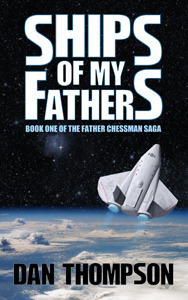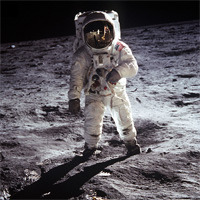Dan Thompson's Blog, page 6
August 12, 2013
Still on haitus for a bit…
Summer at home with the kids is proving more challenging as the weeks go by, and I’ve been making the novels my priority over blogging as the insanity ramps up. On the other hand, my 9-year-old daughter is no longer merely asking “What are your writing?” Instead, she’s asking how the book is coming, and she’s remembering the titles that I’m working on.
August 5, 2013
A short haitus…
We’ve had a death in the family: my mother’s brother. It was not entirely unexpected as he was ninety years old and in poor health. I was not particularly close to this uncle, so I’m doing fine. However, I have had family staying with me plus a few extra family obligations. Something had to give, and blogging was it. I’ll be back soon.
July 29, 2013
What You Sound Like to Me In a Crowd
 This is my vaguely annual post to remind people that I have Auditory Processing Disorder. It’s the hearing equivalent of dyslexia in that I have a hard time turning sounds into words. This gets especially true in a noisy environment. Yeah, I know, you have the same thing. Mine is… well, very likely a lot worse than you can imagine. In a noisy environment, I’m functionally deaf, while everyone else around me is still talking, making the very noise that’s keeping me from understanding the person right in front of me.
This is my vaguely annual post to remind people that I have Auditory Processing Disorder. It’s the hearing equivalent of dyslexia in that I have a hard time turning sounds into words. This gets especially true in a noisy environment. Yeah, I know, you have the same thing. Mine is… well, very likely a lot worse than you can imagine. In a noisy environment, I’m functionally deaf, while everyone else around me is still talking, making the very noise that’s keeping me from understanding the person right in front of me.
I wrote about this at length last year. I don’t really have much to add apart from the fact that it has gotten worse since them. Meh, such is life. Other things make me happy, so cancel the pity party.
Anyway, I did recently come across this video. Its original purpose was to demonstrate to English speakers what English sounds like to people who don’t speak English. That is, it has the same accent, the same distribution of phonemes, etc., but it’s all gibberish. Well, when I get into a loud environment like a crowded restaurant, a lively party, or heaven-help-me a stadium, this is maddeningly like what people sound like to me.
(The actual dialog starts around 0:30.)
So, when you see me trying to read your lips at a social function, bear in mind that you might be sounding like these people to me.
July 24, 2013
Shattered Complete
 So… I finished off my fifth novel this morning, or at least the first draft of it. It’s a mystery, tentatively titled Shattered. I wrote it mostly as an experiment, and I did learn several things from it. It will likely see publication sometime next year, but given the genre difference, I will probably publish it under a different author name.
So… I finished off my fifth novel this morning, or at least the first draft of it. It’s a mystery, tentatively titled Shattered. I wrote it mostly as an experiment, and I did learn several things from it. It will likely see publication sometime next year, but given the genre difference, I will probably publish it under a different author name.
First, the vital stats: It came in short – quite short – at 51,551 words. As I’ve often said regarding NaNoWriMo, 50,000 words is not a novel. Well, at least, it’s not a novel by sci-fi, urban fantasy, or epic fantasy standards. My two published novels are 90k and 85k words long, and even then, they’re on the short end of SF. However, many mysteries tend to be much shorter, in the 60-70k range. This draft is fairly rough – as most of my drafts are – so I expect it to bulk up about 7-10k during my first pass of edits. That’s a typical expansion in actual word count, though obviously it’s a larger percentage. However, this draft has a few notes like “[Whoops, forgot to mention the thing about the ammunition and the lock and the loading procedure. Put that in during edits.]” That’s 500 words right there, and that note is not exactly rare.
What did I learn?
For starters, outlines are still not my thing. It sucked my energy for writing the actual draft, and in the end, I didn’t follow it all that closely. For the 3 days and 5,000 words I put into the outline, it didn’t really help me much at all. I think all I really needed were my destination and waypoints, and once I had those in my head, the rest didn’t really matter.
Then there’s the matter of writing in a completely new genre. Yes, I can do it. I didn’t particularly feel the passion for it, but I was able to sit down pretty much every day and crank out the words. I didn’t need to light the magic candle or wait for the Spirit of the Muse to descend upon me and fill me with her divine inspiration. Nope, it was mostly a matter of putting my butt in the chair and pounding out the words on the keyboard. I think that just comes from the experience of past novels. I did pick up a couple of minor productivity tricks, and I’ll see if they work out again on the next book.
Also, the fact that it was a mystery pointed out a couple of specific lessons I should be able to carry elsewhere. First, character’s motives need to be believable, apparent, but not shouted out at the reader. Apparently some of my background characters have been a little two-dimensional, so I’ll be keeping this in mind going forward. And second, it’s hard but not impossible to spread out all the pieces of the climax to where they’re not obvious and then pull them all together for the big “Aha!” moment. I think I had an intuitive grasp of this already, but doing it in the mystery genre made the act of doing so much more explicit.
But probably my biggest take-away today is that my reaction has been decidedly business-like. I remember the first time I finished off a complete novel draft. I was euphoric for days, but with each novel completed, the emotional reaction had been less. This time, it was pretty much just, “Check that one off the list… what’s next?”
So yeah, what actually is next? I’m finishing off my edits to Debts of My Fathers and getting it off to beta readers. Then I’m doing the post-beta edits to Hell Bent and drafting its sequel, Stone Killer. Then it’s post-beta edits to Debts of My Fathers and drafting Oaths of My Fathers. And somewhere in there, both Hell Bent and Debts of My Fathers will go through copyedits and production to be released late this year.
So, it’s back to the word mines…
July 22, 2013
WorldCon
It’s official. I’m going to WorldCon in San Antonio this year. I haven’t been to a WorldCon since before the kids, which means my last shot was Chicago in 2000. It’s pricey, but at least I don’t have the airfare on top of the hotel.
July 15, 2013
Guilty Pleasures
There have been plenty of high-profile flops over the years, particularly in the realm of SF movies. The party line is that they were bad ideas, they ruined the book, or that that particular sequel never existed. But, I have to admit, I actually liked some of those flops. I even own the DVDs for some of them, and yes, I like to curl up in bed on rainy days and watch them. Ok, not so many rainy days lately, but when I’ve got a cold.
So, what movies are my guilty pleasures?
 The Postman: Yes, Kevin Costner saves the world via US Mail. An entire plotline was stapled onto the original story just so that Costner could have his heroic showdown fight, but the core of the tale remained. Society can be rebuilt by ordinary people stepping up and believing in a better world. Plus, as much as some folks lambasted the film for including Tom Petty as himself, that scene was one of my favorites in the movie. It turned our modern idea of fame on its head, and pointed away from celebrity and towards those ordinary people who stepped up to make a difference.
The Postman: Yes, Kevin Costner saves the world via US Mail. An entire plotline was stapled onto the original story just so that Costner could have his heroic showdown fight, but the core of the tale remained. Society can be rebuilt by ordinary people stepping up and believing in a better world. Plus, as much as some folks lambasted the film for including Tom Petty as himself, that scene was one of my favorites in the movie. It turned our modern idea of fame on its head, and pointed away from celebrity and towards those ordinary people who stepped up to make a difference.
Waterworld: Yes, another Kevin Costner post-apocalyptic box-office disaster – though with overseas markets and DVD sales, it did finally turn the corner on profit. Yes, there are problems with the science, and continuity problems abound with sunburns disappearing and reappearing from one shot to the next, but it was a fun film. I loved the cool gadget that was the Mariner’s boat, and Dennis Hopper’s brusque humor was awesome. “If you’ll notice the arterial nature of the blood coming from the hole in my head, you can assume that we’re all having a real lousy day.”
John Carter (of Mars): I thought was actually a decent film, and I think it did an excellent job of capturing the world of Barsoom that Burroughs laid out in the original books. What seemed to kill this movie, in my opinion, was not the film itself, but that it was poorly marketed, and that poor marketing became the story. In the lead-up to the release, I never saw any articles blasting the movie for itself. I only saw articles talking about how the marketing was being bungled (dropping the Mars references, no FX-laden early previews, etc.) and that this was going to result in poor ticket sales. And sure enough, when the movie opened, everyone went along with the fact that it was going to be a flop. Grrrr.
Hancock: In our movie world of heroic superheroes, apparently there’s no room for a drunk superhero. But I loved this one. The dysfunctional superhero was a great break from never-ending parade of dark-but-stoic, noble-but-naïve, omnipotent-but-tender heroes who always make the right choice. But what really did it for me was the love story that was both tragic and hopeful.
 Red Planet: This one was apparently too boring for most folks, but I found it engaging. While the science jumped back and forth between spot-on and WTF, I enjoyed the gritty problems they engaged, from fire in space, to making an overland trek across the Martian desert. Plus, I really enjoyed Val Kilmer’s character and the sexual tension he had with the pilot Carrie Ann Moss. I’ll admit, the whole robot idea was ill-conceived, but it did add a little excitement. And of course, the line that stuck with me: “This is it. That moment they told us in high school where one day, algebra would save our lives.”
Red Planet: This one was apparently too boring for most folks, but I found it engaging. While the science jumped back and forth between spot-on and WTF, I enjoyed the gritty problems they engaged, from fire in space, to making an overland trek across the Martian desert. Plus, I really enjoyed Val Kilmer’s character and the sexual tension he had with the pilot Carrie Ann Moss. I’ll admit, the whole robot idea was ill-conceived, but it did add a little excitement. And of course, the line that stuck with me: “This is it. That moment they told us in high school where one day, algebra would save our lives.”
The Adjustment Bureau: This one is more properly fantasy than SF, and it did manage to squeak out a profit, but the press was fairly negative on this. Apparently early test screenings were bad, and it was sent back for reshoots and reedits, delaying its release by six months. A lot of my friends panned it. But I loved it. It’s quite literally the tale of a man fighting against his fate… and fate fighting back.
Bicentennial Man: This was a moderately-faithful adaptation of an Isaac Asimov tale of the same name. I remember seeing previews, but then it came and went from the theaters without notice. I suspect too many people dismissed it as “Robin Williams being silly on camera”, just like many dismissed his “Good Morning, Vietnam”. While this film did have a few comical moments, it was a quite serious quest of a robot to become human. If you felt sympathy for Star Trek’s Data, then you need to see this film. Going back to the original novella, this was probably the prototype robot Pinocchio tale.
Dark Star: Ok, this film is not actually good. It’s actually ridiculously bad. In no way whatsoever should you take this as a recommendation for the film. However, the final fifteen minutes of the film with the talking bomb are priceless. That part, at least, is a must-see piece of science fiction cinematic history.
So, what movies do you count as guilty pleasures?
July 12, 2013
Radio Silence?
Sorry I’ve been quiet this week. I’m a bit behind on my current draft, so the blog writing has been sacrificed on the alter of word-count. Meanwhile, I’ve put in about 15,000 words on Shattered this week, so that’s something.
July 8, 2013
What Genre Are Superhero Movies?
Let me start by saying I don’t have the answer to that question. Superman is an alien, so Sci-Fi, right? But Hellboy is a demon, so is it fantasy? Or do those two just fall into completely separate categories? But then there’s the Avengers, where the ultimate gadget man Tony Stark (a.k.a. “I am Iron Man”) is fighting alongside Thor, god of thunder from Norse mythology.
Or should I even bother? Maybe not. After all, superhero movies are usually the epitome of popcorn flicks, so apart from arguing whether the overdone effects can actually fit through the plot holes, maybe they’re not worthy of deep analysis. Then again, they put our human (and sometimes not-so-human) frailties into the crucible to extract something pure. Superman struggles against the ultimate limits of even his power. The Avengers put teamwork over individual ego. Batman faces his personal demons and decides to not be quite so grim after all.
But why care about the genre in particular? Because genres have rules, and those rules support a lot of story elements. That is, rather than limiting the story teller to the contents of this box, it cracks open the crate from the secret warehouse and dumps out all manner of things that work. I’m just trying to figure out which crates we’re opening up. Is time travel in the box? High technology? Godlike powers? How about magic? The ability to cheat death?
I’ll say that most superhero movies are relying on items from the science fiction crates. We have aliens, mutants, gamma ray overdoses, mysterious meteor showers, and so on. Even then, the leaps we make from these are far from what we allow in more traditional sci-fi fare. After all, in most SF, a lethal overdose of gamma radiation is, well… lethal. It’s not the source of anger-inspired super-strength.
But some of these heroes are clearly relying on stuff from the fantasy crates. The Mask used a magical artifact. The Ghost Rider has made a deal with the devil, and Hellboy is what… the devil’s own scion? These aren’t traditional fantasy tropes, or at least not from the epic Tolkien fantasy vein, but in the more modern genre of urban fantasy, these aren’t that strange.
Or maybe I’m trying to fit a triangular peg in either a round or square hole. Are superhero films really their own independent genre with its own crate of rules, tropes, and McGuffins? With both Marvel and DC mining their IP vaults, we might very well be headed there by volume alone. If we are, I’m not sure I know enough about superheroes to really say what those rules are.
What do you think?
July 3, 2013
Welcome and Writing Update
 I did a free Kindle promotion for Ships of My Fathers last week, and it was fairly successful. Worldwide, a little over a thousand folks downloaded it. It seems a number of you enjoyed it and told your friends, and some of them are now buying it. Yay! Thank you.
I did a free Kindle promotion for Ships of My Fathers last week, and it was fairly successful. Worldwide, a little over a thousand folks downloaded it. It seems a number of you enjoyed it and told your friends, and some of them are now buying it. Yay! Thank you.
Also, it seems a few of you have followed the links in the book and ended up here at my blog. Welcome. I tend to blog about three times a week. Sometimes more, sometimes less. On Mondays, I usually write an essay relating to the genres I read and write, though sometimes you’ll just get some update on what’s happening in my life. On Wednesdays, I try to write something about writing and publishing. I’m not really trying to build an audience of writers, so I try to pick topics that might also interest readers. And on Fridays I post a review of a book or a movie. Random events intrude, so the schedule is a goal, not a guarantee.
If you are another writer wanting to talk about writing, I’m fairly active in the writing communities on Google+, and I encourage you to look me up there.
A couple of weeks back, I laid out my writing projects for the summer, so I thought I’d give a few updates on those.
Hell Bent: It is still with the beta readers. A few of them have finished their first pass but are going through it a second time before giving me their detailed feedback. It will be another week or two before I start gathering that stuff up, but the initial reactions sounded good. I hope to do the post-beta edits in August and get it to my copyeditor in September. Publication is still slated for November.
Debts of My Fathers: This is the sequel to Ships of My Fathers. I have now made my initial red-line edit pass over the printed document. I’ll start integrating those changes into the document over the next week. I hope to get it to my beta readers sometime in August. Publication is still slated for December or January. Of course, given my series goal of drafting book N+1 before publishing book N, I will need to draft book 3, Oaths of My Fathers, sometime in the fall.
 Shattered: Contrary to my theme of “making it up as I go”, I actually did something of an outline for this one. It ended up being a 5000 word summary of events. In some ways it has been helpful. Given that I’ve never attempted this genre, it was useful to lay out the order of events. That way, I’ll know all the pieces are in place before the big reveal.
Shattered: Contrary to my theme of “making it up as I go”, I actually did something of an outline for this one. It ended up being a 5000 word summary of events. In some ways it has been helpful. Given that I’ve never attempted this genre, it was useful to lay out the order of events. That way, I’ll know all the pieces are in place before the big reveal.
On the other hand, now that I’ve begun the actual text of the narrative, I’m already seeing ways in which I want to change some of those pieces. In fact, I’m feeling a strong desire to set aside the ongoing text and go back to edit the outline, and that sounds like it could be an unending task with no real progress going forward. Also, the mere existence of the outline is sapping my energy to write the book, since in some ways I’ve already spent the driving need to tell the story. So, for the moment, I’m doing my best to forget that I ever wrote the damned outline in the first place and only referring back to it for some of the research that I embedded into it. I hope to wrap this up by the end of July, but I’m already behind schedule.
Stone Killer: This is the sequel to Hell Bent. It’s still in pre-draft limbo. I like to think of it as sitting on the back burner of the stove as I add little ideas here and there. This one is taking shape in my more traditional fashion, sans outline. I know how it starts, and I know how it ends. I’m just plotting a few waypoints in between to help me go in the right direction. I hope to start drafting this in August.
That’s it for now. The narrative calls, so I’m heading back into the word-mines.
July 1, 2013
Mars One and Death
 Mars One is a project to start colonizing Mars funded by a reality TV show of the volunteers who go. It looks quite serious, and they seem to have a reasonable technical plan for getting four astronauts to the surface of Mars with enough supplies and equipment to survive for an indefinite period going forward. The plan would be for more volunteers to arrive at the rate of four every two years, but this is to add to the population, not to rotate them back out.
Mars One is a project to start colonizing Mars funded by a reality TV show of the volunteers who go. It looks quite serious, and they seem to have a reasonable technical plan for getting four astronauts to the surface of Mars with enough supplies and equipment to survive for an indefinite period going forward. The plan would be for more volunteers to arrive at the rate of four every two years, but this is to add to the population, not to rotate them back out.
The front-loaded price tag looks to be in the neighborhood of $6 billion USD, which they are trying to raise privately. Part of me wants to vent in frustration that if only NASA and the US Congress had the balls to step and fund something like this, it would be a done deal, but that’s a rant for another time. Perhaps the biggest challenge Mars One faces is not the technical problems but the financial one of raising that much money before much of any television revenue materializes. I wish them luck.
 Mostly, though, I want to talk about death, because that’s where these guys are headed. They make no bones about it, but this is a one-way ticket. I don’t think that they’re going to perish en route or in their first week, but the very real fact is that these volunteers are going to die on Mars. There is no return-flight on the horizon. This is nothing all that new in human history. There have been plenty of cases where colonists sailed off to the wilderness, fully intent on never returning, but in today’s world of jet travel, we’ve gotten away from that thinking.
Mostly, though, I want to talk about death, because that’s where these guys are headed. They make no bones about it, but this is a one-way ticket. I don’t think that they’re going to perish en route or in their first week, but the very real fact is that these volunteers are going to die on Mars. There is no return-flight on the horizon. This is nothing all that new in human history. There have been plenty of cases where colonists sailed off to the wilderness, fully intent on never returning, but in today’s world of jet travel, we’ve gotten away from that thinking.
But how soon will they die? Hopefully, they will a long time there, but conditions will be harsh, and simple activities will be fairly dangerous. I think there is a better than 50-50 chance that all four colonists would make it through the first two years. At that point, the next batch of colonists will arrive, and more construction will ensue for the next batch to arrive another two years into the future. However, if one of them dies before that second batch arrives, I worry that the project will falter. I’m sure they worry as well, and they seem to be doing everything they can to make those first two years as safe as possible with redundant systems.
Still, in the long run, there may be health problems associated with low gravity. Also, between the trip and years spent under Mars’ thin atmosphere, radiation will increase the risk of cancer. Furthermore, the limited food supply may cause other health issues. It seems reasonable to think that a colonist’s remaining life expectancy on Mars might be half of that on Earth. A fifty-year-old who thought he had another thirty years left to him might only get fifteen. A twenty-year-old hoping to last until eighty might be dead at fifty. But then, a seventy-year-old might only be trading away five years of life-expectancy.
So, is it worth it? Obviously that’s a question for each individual, and for the 80,000 or so who have already signed up, the answer appears to be yes. I suspect the selection criteria is going to aim for healthy people in their thirties to fifties. They have good life experience, and at that age, it seems less likely that their decision to go would be based on a youthful whim. Add another eight years of training, and we’re talking about sending people in their forties to sixties. They might only be trading away ten to twenty years.
For some, it would be worth it just to have the experience of living on Mars. I confess that if my life had gone another direction and left me without my wife, children, and other close friends, it would be seriously tempting. I’m a lifelong SF geek, and the idea of waking up every morning on another planet is serious wish-fulfillment territory. I might trade a decade of life for such an experience.
 For others, there might be a little lure for fame. Certainly with the reality TV show funding the ongoing operations, there will be a lot of fame back on Earth, but there is also the compelling allure of a place in the history books. They will be up there with Columbus and Neil Armstrong in the history books. Martian high schools will someday be named after them. Historians will perpetually debate the critical airlock decision of 2027. For some people, that is essentially their immortality, and an early death on the mortal plane is worth it.
For others, there might be a little lure for fame. Certainly with the reality TV show funding the ongoing operations, there will be a lot of fame back on Earth, but there is also the compelling allure of a place in the history books. They will be up there with Columbus and Neil Armstrong in the history books. Martian high schools will someday be named after them. Historians will perpetually debate the critical airlock decision of 2027. For some people, that is essentially their immortality, and an early death on the mortal plane is worth it.
But for some special few, I think they will want to do simply to push humanity into the heavens. They won’t care about Earth-side opinions. They won’t care if their name is spelled right in the history books. They’ll care that we got out there and someday, went even further. Hopefully, they’ll die decades from now when people are planning the tentative robotic exploration of some Earthlike exoplanets orbiting other stars. They will slip gently into the night, comforted by the knowledge that humanity won’t.
If I had my pick, these are the ones I would send up first.



